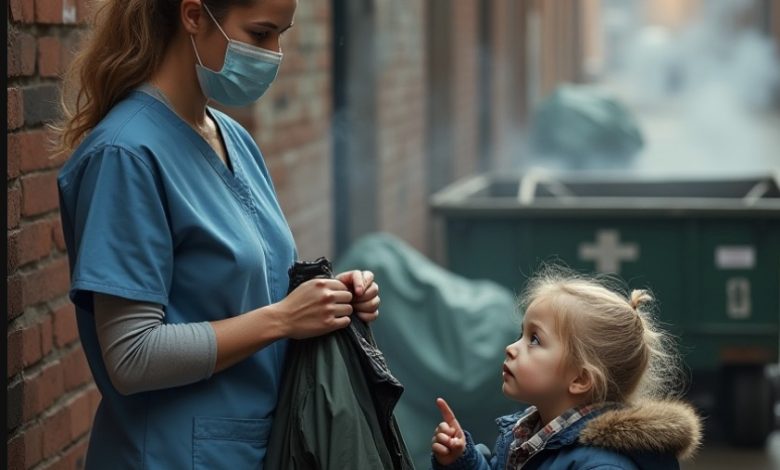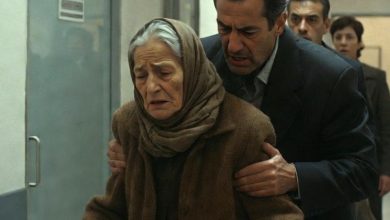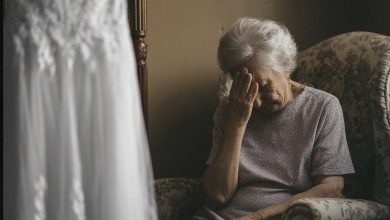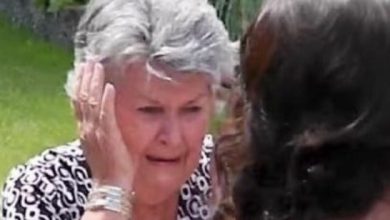“She Asked for an Old Coat to Help Her Sick Mother — What She Found Inside Shocked Everyone”

A nine-year-old girl asked for a discarded hospital coat to keep her sick mother from freezing. What she found hidden inside that coat would change everything: a letter pointing to a secret treasure…
“Please, wait! Can I have that? It’s for my mom.”
The small voice cut sharply through the icy Cleveland air. Nora, just nine years old, hurried forward toward a weary hospital orderly. The woman, dressed in faded gray scrubs, had just lifted a heavy black trash bag, ready to toss it into the large metal dumpster at the back of the hospital. The bag was stuffed with belongings patients had left behind, clothing no one had claimed.
“She doesn’t have anything warm,” Nora pleaded, her words escaping in clouds of breath that hung in the cold.
The orderly paused, lowering the bag. Her shoulders sagged after what must have been a long shift. She narrowed her eyes. “Where did you even come from, kid?”
“I’ve been waiting,” Nora admitted softly, her gaze fixed on the bag. “I know sometimes you throw away good clothes. People forget things. My mom… she really needs a coat. It’s so cold out now.”
The woman’s expression hardened at first, her voice sharp. “Your mother ought to be out working instead of sending her little girl to dig through hospital trash.” But when she looked closer—at Nora’s thin jacket, her tangled hair, and the fierce determination burning in her young eyes—the edge in her tone softened. She sighed. “Fine. Take what you want. But make it quick before the supervisor sees us. Go on, hurry.”
Nora nodded eagerly. The woman pulled a heavy wool coat from the bag, the one she had been ready to throw away. Nora clutched it tightly, thanked her in a rush, and ran out of the alley, her heart beating fast with triumph.
This wasn’t just any coat—it felt like treasure. The wool was thick and chocolate-brown, trimmed with a soft fur collar. It was heavy, almost grand. The scent still lingered on it, faint but unmistakable: lavender, soap, and the delicate trace of expensive perfume. To Nora, it smelled like a world her mother used to belong to, before life had broken her down.
Holding it close, Nora took the bus across the city, jostled by strangers. When the ride ended, she ran the last blocks, then bounded up the five flights of stairs in their crumbling apartment building. Their front door, as always, was unlocked.
“Mom! Mom, look what I got for you!”
She burst into the dim apartment, rushing to the narrow bed. On it lay her mother, Elena, her frame too thin, her elegant fingers resting lightly on a battered poetry book. Her dark chestnut hair, once glossy, now hung lifelessly across the pillow. Even weak and pale, her beauty was striking, like a faded painting in a forgotten museum.
“Nora? You startled me,” Elena murmured, her voice soft and tired. “I must have drifted off. What is it you brought?”
“A coat, Mom. A warm one,” Nora said, her words tumbling out quickly. “They were throwing out clothes at the hospital, and I asked for it. You don’t have a good coat, so I thought—”
Elena’s face flickered, showing both pride and sorrow. “My clever, clever girl. What would I do without you? Your mother’s no good, can’t even stay well.”
“Don’t say that,” Nora interrupted firmly. “You just need to rest. I’ll cook dinner tonight. We’ve still got pasta and that can of tuna. You’ll feel better.”
Elena’s illness had a name—depression—but that word was far too small to hold the weight of what it did to her. To outsiders, it looked like laziness or sadness. But Elena knew it was as real as cancer, eating her from the inside, stealing her will, her light, and her art.
Once, Elena had been alive with fire and talent. She had been born to paint, though her father disapproved. “An artist? Elena, that’s not work. Be sensible. Study law or accounting!” But she ignored him, following her passion. Her skill earned her a place as apprentice to Mr. Sanderson, a gruff but brilliant painter who recognized her gift immediately.
“You’ve got it, girl,” he told her, peering at her canvases. “Don’t let anyone say otherwise.”
It was in that studio that she met Gavin. He was the son of a famous artist, handsome, confident, and a painter himself. His own talent was middling, but he carried his father’s connections like armor. Critics praised his work more out of fear than admiration.
He noticed Elena quickly. She was tall, intense, chestnut hair cascading over her shoulder as she painted. He stepped behind her once, gathering her hair gently and tying it into a bun. “Now it won’t get in your way,” he smiled.
Elena’s heart raced. It was the kind of sweeping, passionate romance she thought only existed in novels. They married quickly. His family gave them a loft, which doubled as a studio. In the early days, life felt enchanted—gallery openings, bohemian nights, long hours painting side by side. But soon, the differences showed. Gavin’s paintings sold. Elena’s did not.
“I don’t understand,” she whispered once, staring at one of her landscapes. “Why does no one buy my work?”
“Because it’s not what sells,” Gavin replied smoothly. “You paint for yourself, not for buyers. You have to paint what people want on their walls. This is business, not just passion.”
Later, Elena overheard him speaking to his father. “She’s getting too good,” Gavin hissed. “If she shows her work, I’ll be overshadowed. There can only be one star here.”
His words struck her like a knife. Slowly, he undermined her, belittled her, until her confidence cracked.
Then came their daughter, Nora. Elena was overjoyed. Gavin was not. To him, Nora was a distraction. Her cries interfered with his “creative process.” When she spilled paint in his studio as a toddler, he exploded in rage.
“You’re a mediocrity, Elena,” he spat one night. “You’re good for diapers and cooking. That’s all.”
The blow was worse than any physical strike. Eventually, she found him with another woman in the studio. He didn’t even apologize. “An artist needs inspiration,” he shrugged.
That was the end. She left him, taking Nora and moving into her parents’ crumbling apartment. The depression soon followed, swallowing her whole.
But Nora? Nora learned to survive. She taught herself to cook, to watch over her mother, to scavenge what they needed. Which was why, on that cold day, she was searching the hospital’s trash.
As she brushed dust from the coat, she explored its pockets. Both side ones were empty. But then her fingers found a hidden inner pocket, closed with a small burgundy button. Inside, she pulled out a yellowed envelope.
The front read: To Alex Sidorov, House 2, Rook Creek. No stamp. No postmark.
Inside was a letter. Nora read it aloud, her voice steady:
My dearest grandson. My name is Zina Sidorova. If this letter finds you, know that I loved you with all my heart. Behind the wardrobe in the studio wall, there is a secret place. What you find there will help you if ever you are in need. Forgive me, and ask your mother to forgive me too. Goodbye, and be happy. Your grandmother, Zina.
Nora’s eyes widened. “Mom! Did you hear? There’s a secret hidden in a wall!”
Elena shook her head, exhausted. “It’s just an old story, sweetheart.”
But Nora would not let it go. “We have to deliver it, Mom. What if it’s real?”
And so, against Elena’s doubts, they set out.
The journey to Rook Creek drained their last money. Two buses and a long walk later, they stood before a weathered wooden gate. Nora knocked.
A tall man, paint-stained hands wiping on a rag, opened the door. “Who’s there?”
“We’re looking for Alex Sidorov,” Elena said. “We have a letter.”
“I’m Alex,” he said. “A letter?”
Elena handed it to him. As he read, his face transformed. He pressed a hand over his mouth, tears filling his eyes. “Grandma Zina,” he whispered.
He welcomed them in, offering tea. His home smelled of turpentine and woodsmoke. An artist’s studio.
The next day, with Nora’s urging, they searched behind the wardrobe. A brick was loose. Alex pried it free, pulling out a bundle wrapped in lace. Inside lay antique jewelry: a gold ring, sapphire earrings, a locket set with rubies.
“They’re worth a fortune,” Elena breathed.
“My grandmother’s secret,” Alex said softly. “She must have hidden them before being forced away.”
From that moment, everything shifted. Alex offered them shelter, then companionship, then something like family. He encouraged Elena to paint again. Slowly, color returned to her world.
A year later, Elena and Alex exhibited their work together in a city gallery. Nora, blooming with joy, beamed at her mother’s success. Elena wore Zina’s sapphire earrings.
And then, in the crowd, Elena saw Gavin—ruined, disheveled, begging.
But this time, she felt no fear. No sadness. Only strength.
Nora took her mother’s arm, looked Gavin in the eyes, and said coldly: “My father is Alex Sidorov.”
They walked away, leaving Gavin to his emptiness.
What began with a discarded coat and a hidden letter had brought them not just treasure, but healing, love, and a new life.
Elena had once believed she was broken. But in truth, she had only been waiting—for the moment to begin again.










